Portugal
Enchanting Beauty and Historical Splendor
Embark on a journey through time, culture, and natural beauty in Portugal. From the enchanting streets of Lisbon to the idyllic beaches of the Algarve, and the awe-inspiring landscapes of the Azores, this country offers retirees a wealth of experiences to create lasting memories. Portugal's warm hospitality, combined with its rich history and vibrant culture, promises an unforgettable voyage that will leave a lasting impression on the hearts of those who visit.
Portugal's allure extends beyond its cities and regions. Immerse yourself in local festivals, such as the lively Santo António celebrations in Lisbon or the traditional Festa de São João in Porto. Savor the renowned Portuguese cuisine, known for its fresh seafood, flavorful olive oil, and hearty dishes like bacalhau (salted codfish). The country's mild climate throughout the year makes Portugal an ideal destination for retirees seeking a comfortable and pleasant vacation and for many a great place to retire.
Lisbon: Where History and Contemporary Flair Unite

Photo by Pixabay / Pexels |
As you explore the vibrant city of Lisbon, be prepared to be captivated by the juxtaposition of ancient charm and modern energy. Wander through the narrow streets of Alfama, one of the oldest neighborhoods in the city, where you can admire the colorful facades of traditional houses and hear the soulful strains of fado music drifting from local taverns. Don't miss the iconic São Jorge Castle, offering panoramic views of the city and the Tagus River. |
| Retirees will also enjoy visiting the Belém district, home to the stunning Belém Tower and the Jerónimos Monastery, both UNESCO World Heritage sites. Indulge in the famous pastéis de nata, Portugal's delectable custard tarts, while sipping a cup of aromatic coffee in one of the charming cafes.
|
Porto: A Gem of Culture and Port Wine
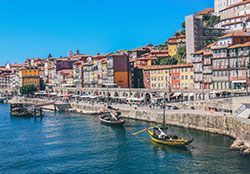
Photo by Nick Karvounis / Unsplash |
For retirees seeking a taste of Portugal's rich heritage, Porto is a must-see destination. It is situated along the Douro River with stunning architecture, offers a delightful blend of history, gastronomy and its famous port wine. Take a leisurely stroll along the Ribeira district, a UNESCO World Heritage site, and soak in the colorful tiled buildings, charming alleys. Enjoy the lively atmosphere along the waterfront with its many outdoor cafes and walk across the iconic bridge for striking view of the city and river far below. |
|
Visit the Livraria Lello, one of the most beautiful bookstores in the world, which inspired J.K. Rowling while she was writing the Harry Potter series. Don't forget to indulge in a glass of port wine while enjoying panoramic views of the city from the Dom Luís I Bridge. Situated across the Douro River from Porto, Vila Nova de Gaia is famous for its port wine cellars. Retirees can take a tour of the cellars, learn about the history and production of port wine, and enjoy tastings. The riverside promenade offers stunning views of Porto's skyline, making it a lovely place to relax and soak in the ambiance.
|
The Algarve: Paradise Found
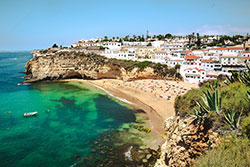
Photo by Jo Kassis / Pexels |
Retirees seeking relaxation and natural beauty will find their haven in the Algarve. This southern region of Portugal boasts breathtaking golden cliffs, secluded coves, and azure waters. Spend lazy days on some of Europe's most beautiful beaches, such as Praia da Marinha or Praia de Dona Ana. For those looking for a bit more adventure, embark on a boat tour to explore the stunning Benagil Cave, a natural wonder sculpted by the sea. |
| Golf enthusiasts will be delighted by the numerous world-class golf courses in the region, offering challenging greens amidst stunning coastal landscapes. |
The Azores: Nature's Masterpiece
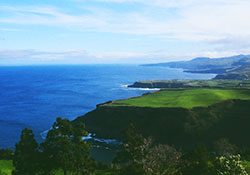
Photo by Julio Gm / Pexels | For an unforgettable experience in the lap of nature, venture to the Azores islands. This archipelago, located in the middle of the Atlantic Ocean, is a haven of lush green landscapes, dramatic volcanic craters, and breathtaking waterfalls. Explore São Miguel Island, the largest in the archipelago, and be mesmerized by the stunning beauty of the Sete Cidades crater lakes. Embark on a whale-watching tour and witness these majestic creatures in their natural habitat. |
|
The Azores are located in the North Atlantic Ocean, about 1,500 kilometers (930 miles) west of Lisbon To get to the Azores there are daily flights from Lisbon and Porto to the islands of São Miguel and Terceira. There are also flights from Madeira to São Miguel. The flight time from Lisbon to São Miguel is about 2 hours and 30 minutes. Once in the Azores, you can travel between the islands by ferry or plane. There are also regular ferry services from the Azores to mainland Portugal. |
Sintra: Fairytale Castles
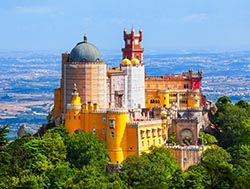
Photo by Saiko3p / Adobe Stock | Nestled amidst lush forests and rolling hills, Sintra is a captivating destination to a fairytale-like setting. This charming town is a short train ride from Lisbon and makes a great day trip. It offers enchanting palaces, stunning gardens, and mystical atmosphere. Sintra beckons retirees to explore its wonders. Visit the iconic Pena Palace, a colorful blend of architectural styles perched atop a hill, offering breathtaking views of the surrounding landscape and coastline. |
| Wander through the whimsical gardens of Quinta da Regaleira, where secret tunnels and mystical symbolism await discovery. Immerse yourself in the romanticism of the Sintra National Palace, known for its exquisite tilework and historical significance. As you stroll through the narrow streets, lined with quaint shops and charming cafes, you'll feel as though you've stepped into a storybook. Sintra's serene ambiance and picturesque beauty make it a cherished destination for retirees seeking a blend of history, nature, and tranquility. |
The Silver Coast
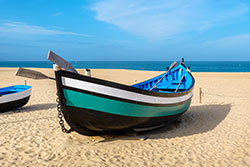
Photo by Andrei Nekrassov / Adobe Stock |
Stretching from the outskirts of Lisbon to the historical city of Porto, this idyllic region is known for its unspoiled beaches, picturesque fishing villages, and a relaxed pace of life. The Silver Coast offers a perfect balance of natural beauty and cultural experiences. Explore the charming town of Óbidos, enclosed within medieval walls, where narrow cobbled streets and colorful houses transport you back in time. |
| Breathe in the fresh sea breeze as you stroll along the long sandy beaches of Peniche and Nazaré, renowned for their surf breaks and natural beauty. Retirees can also visit the magnificent Monastery of Alcobaça, a UNESCO World Heritage site, and the impressive Batalha Monastery, known for its Gothic architecture. With its laid-back atmosphere, scenic landscapes, and cultural treasures, the Silver Coast offers a serene haven for retirees seeking relaxation, coastal charm, and a glimpse into Portugal's rich history. |
Best Time to Visit:
Overall, Portugal is a year-round destination with a Mediterranean climate, so it largely depends on your preferences and activities. Spring and autumn are generally considered the best times to visit, offering pleasant weather, fewer crowds, and a vibrant atmosphere. However, if you enjoy warmer temperatures and beach activities, summer is the ideal time, while winter is great for exploring cities and enjoying cultural events.
Spring (March to May): Spring is a delightful time to visit Portugal as the weather begins to warm up, and the countryside comes alive with colorful flowers. The temperatures are pleasant, ranging from around 15°C to 20°C (59°F to 68°F), making it ideal for exploring cities, coastal areas, and cultural attractions. It's also a great time for outdoor activities like hiking and sightseeing.
Summer (June to August): The summer months in Portugal are hot and dry, particularly in the inland areas. The coastal regions, including the Algarve, enjoy cooler temperatures due to the Atlantic breeze. Summer is perfect for beach lovers, as the water temperatures are warm and inviting. However, popular tourist destinations can get crowded during this time, especially in July and August. If you prefer a more relaxed and peaceful atmosphere, consider visiting in June or early September.
Autumn (September to November): Autumn in Portugal is another excellent time to visit, as the weather remains pleasant, and the summer crowds begin to disperse. The temperatures start to cool down, ranging from around 15°C to 25°C (59°F to 77°F), making it comfortable for outdoor activities. Autumn is also the harvest season, offering the opportunity to participate in wine festivals and enjoy the abundance of local produce.
Winter (December to February): Portugal experiences mild winters, especially along the coast. While the northern regions can be cooler and see some rainfall, the southern parts, like the Algarve, remain relatively mild. Winter is an ideal time to explore cities like Lisbon and Porto, as they are less crowded, and you can enjoy the festive atmosphere during Christmas and New Year's. If you're interested in surfing, the winter months offer good swells on the Atlantic coast.
Travel Planning Tips:
Plan Ahead: Research and plan your itinerary in advance to make the most of your time. Consider the locations you want to visit, the duration of your stay, and any specific attractions or activities you don't want to miss.
Cash and Currency: The currency used in Portugal is the Euro (€). It is recommended for tourists to exchange their currency for Euros before or upon arrival in Portugal.
There are several options for exchanging currency in Portugal. You can exchange money at banks, currency exchange offices, or use ATMs to withdraw cash in Euros. It's a good idea to compare exchange rates and fees to ensure you're getting the best deal. Additionally, major credit cards are widely accepted in hotels, restaurants, and shops, but it's advisable to carry some cash for smaller establishments and local markets.
Remember to notify your bank or credit card company about your travel plans to prevent any issues with using your cards abroad.
Travel Insurance: Ensure that you have comprehensive travel insurance that covers medical expenses, trip cancellation, and any potential emergencies. Review the policy details and know how to access medical assistance if needed.
Local Customs and Etiquette: Familiarize yourself with local customs and etiquette. Go say "hello" in Portuguese, you can use the word "olá" (oh-LAH) or "oi" (oy). To say "thank you," the word is "obrigado" (oh-bree-GAH-doo) if you are male, and "obrigada" (oh-bree-GAH-dah) if you are female. To say "please," you can use "por favor" (poor fah-VOHR). This phrase is commonly used to politely ask for something or make a request. To say "goodbye" in Portuguese, you can use the word "adeus" (ah-DEH-oosh) or "tchau" (chow). "Adeus" is a more formal and traditional way to say goodbye, while "tchau" is a more casual and commonly used term.
Stay Hydrated: Drink plenty of fluids and carry a water bottle especially during the summer months.
Travel Documents: Ensure you have a valid passport with at least six months' validity remaining.
Visa Requirements: The visa requirements for Portugal vary depending on your nationality and the duration of your stay. Citizens of many countries, including the United States, Canada, Australia, and the European Union, do not need a visa for stays up to 90 days within a 180-day period for tourism or business purposes. However, it is essential to check the visa requirements specific to your nationality before traveling.
It is important to note that visa and entry requirements can change over time, so it's best to verify the latest information before your trip. The official website of the Portuguese Ministry of Foreign Affairs or consulting with the nearest Portuguese embassy or consulate can provide the most accurate and up-to-date information regarding visa requirements for your specific situation.
Accommodations:
When choosing an accommodation in Greece, it is important to consider your budget, your needs, and your preferences. If you want to experience Greek culture and hospitality, a B&B or or a small hotel may be a good option. If you need more space and privacy, an apartment or a villa may be a better choice.
Transportation:
- Domestic Flights: Portugal has several airports across the country, with the major ones located in Lisbon, Porto, Faro, and Funchal (Madeira). These airports serve as major hubs for domestic flights, connecting different cities and regions within Portugal. Domestic flights within Portugal are generally short in duration due to the country's relatively small size. For example, a flight from Lisbon to Porto takes around one hour, making air travel a convenient option for travelers with limited time or those seeking to cover long distances quickly. It is advisable to book domestic flights in advance to secure the best fares and ensure availability, especially during peak travel seasons.
In addition to the major airports, Portugal has regional airports that cater to specific areas. For instance, the Azores islands have their own regional airports, such as Ponta Delgada Airport and Terceira Airport, offering connections between the various islands and mainland Portugal.
- Baggage Allowance: Pay attention to the baggage allowance and restrictions imposed by airlines when traveling domestically in Portugal. Different airlines may have varying rules regarding luggage size, weight limits, and additional fees for excess baggage. Pack lightly! If you are planning to use trains while there, you will need to disembark quickly to avoid missing your stop.
- Public Transportation:
Portugal has an extensive public transportation network, including trains, buses, metros, and trams. Consider purchasing a rechargeable transport card, such as the Lisboa Card or Porto Card, for discounted fares and ease of travel. Keep in mind trains do not linger at stops, you will need to disembark quicky or you may miss your stop. (We speak from experience). For this reason, pack lightly. Also when in Portugal booking your train, ask the agent to ensure you are seated together, as their computer system maight separate you to fill the train.
- Rental Cars: If you plan to explore beyond major cities, renting a car can be a great option. Portugal has well-maintained roads and highways. Remember to have a valid driver's license and consider purchasing insurance coverage for your rental vehicle.
- Taxis: Taxis are widely available in Portugal. Ensure the taxi has a working meter or agree on a fare before the journey. Ride-sharing services like Uber and Bolt are also popular and provide convenient transportation options.
Safety Tips:
While Portugal is one of the safest countries, like any travel destination, it's important to take basic safety precautions.
- Personal Belongings:
Keep your valuables secure, be aware of your surroundings, and avoid displaying wealth or carrying large amounts of cash.
- Stay Informed: Stay updated on current events, travel advisories, and any local safety concerns. Register with your embassy or consulate before traveling to receive important updates and assistance if needed.
- Protect Against Pickpocketing: Take precautions against pickpocketing, especially in crowded tourist areas. Keep your belongings secure and be cautious of your surroundings. Consider using a money belt or anti-theft bag for added security.
- Use Reliable Transportation: When traveling within Portugal, opt for reputable transportation services. Public transportation such as trains, buses, and metros are generally safe and convenient. If renting a car, familiarize yourself with local driving laws and road conditions.
- Prescription Medications:If you take prescription medications, ensure you have an ample supply for the duration of your trip. Carry them in their original packaging, along with copies of prescriptions, in case you need to refill or replace them while in Greece.
- Stay Hydrated: Maintain adequate hydration by drinking plenty of water, especially in warmer months or when participating in outdoor activities. Carry a refillable water bottle and stay hydrated throughout the day.
- COVID-19 Precautions: Stay informed about the latest COVID-19 guidelines and restrictions. Follow local regulations, wear masks where required, practice social distancing, and maintain good hand hygiene. Stay updated on travel advisories and requirements from your home country as well.
- Emergency Numbers: Save important contact numbers, including local emergency services, your embassy or consulate, and your accommodation's contact information. In case of any emergencies, you'll have quick access to the necessary resources.
- Travel Advisories Stay updated on current events, local regulations, and any travel advisories when traveling abroad. Visit the US Government State Department Travel Advisories web site to check on the status of your destination.
- Enroll in the STEP Program: Travelers are also urged to enroll in the U.S. State Department's Smart Traveler Enrollment Program (STEP) to receive security messages and to make it easier to locate them in an emergency. The Department uses these security messages to convey information about terrorist threats, security incidents, planned demonstrations, natural disasters, etc. In an emergency, please contact the nearest U.S. Embassy or consulate or call the following numbers: 1 (888) 407-4747 (toll-free in the United States and Canada) or 1 (202) 501-4444 from other countries.
| |
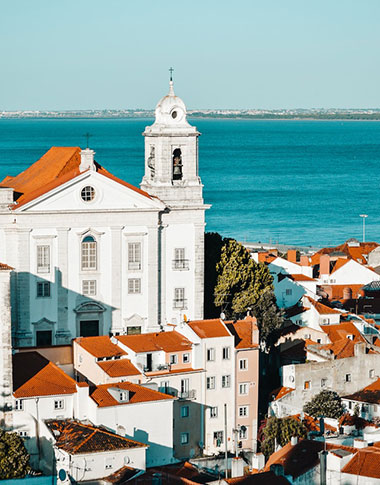 White-washed architecture, Lisbon Photo by Helena I / Pixaby
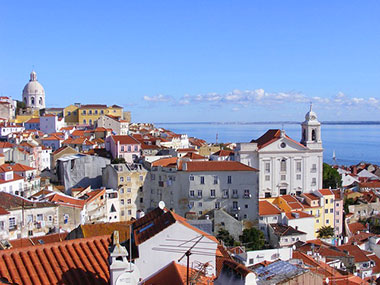 Lisbon
Photo by Kontostudenta / Pixaby
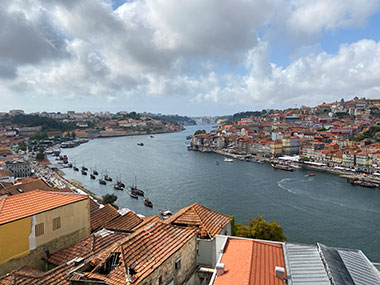 Douro River, Porto
Photo by Charmaine Anderson
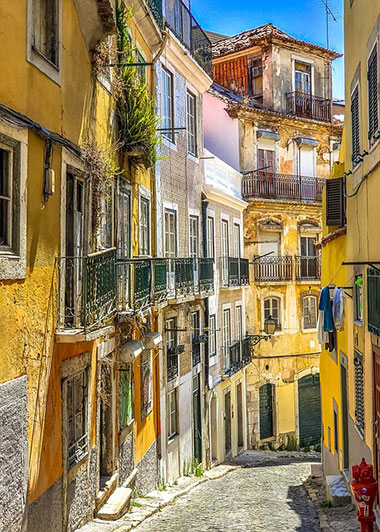 Lisbon
Photo by Andrzej / Pixabay
|
 White-washed architecture, Lisbon
White-washed architecture, Lisbon Lisbon
Lisbon Douro River, Porto
Douro River, Porto  Lisbon
Lisbon